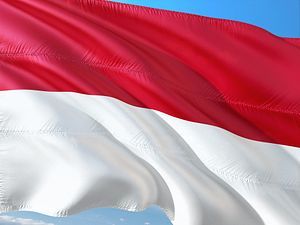Industry in Indonesia is going through a series of changes in its development with a view to contributing significantly to the Vision 2045 proposed by the country’s ruling class. Vision 2045 sets a goal for Indonesia to be one of the world’s top 10 economies by that year, and an industrial powerhouse, leading the archipelago nation to be able to overcome the barrier of a middle-income country. Even in the pandemic age, Indonesia’s industrial changes deserve attention and can open up opportunities for Latin American countries.
Indonesian President Joko “Jokowi” Widodo has emphasized in his speeches that Indonesia must stop exporting raw materials, both from the mining sector and agriculture, in order to move up the value chain. In the first case, he highlights the ban on the export of nickel from 2020 so that it can be smelted and processed as a higher value-added product. In the case of agriculture, there has been talk of a future restriction and/or ban on the export of palm oil.
Indonesia seeks to industrialize its raw materials so that there is greater added value and more labor employed in the country, among other effects. This shift would have lasting gains for Indonesia. For example, some of the raw materials to be processed from the mining sector, for example, would go to strategic industries of the future such as electric vehicles and batteries.
Indonesia also seeks to substitute imports with domestic products, cutting imports by up to 35 percent by the year 2022. It is an ambitious measure. Broken down by sectors, the chemical, pharmaceutical and textile industries have achieved an import substitution of up to 21 percent, while agribusiness the figure is 19 percent. The health sector will be a noteworthy one to watch, as one of Indonesia’s ambitions is to become a regional hub for vaccine production.
Much has been discussed so far about how the pandemic has accelerated the use of digital devices, in all possible formats, both for personal and industrial use. Flexibility and speed to innovate and produce, as well as to consume, are issues that the industrial sector in Indonesia is taking into special consideration.
In the Making Indonesia 4.0 policy, the government initiated the development of the Indonesia Digital Industry Center 4.0 (known as PIDI 4.0), where the digital economy should contribute to the increase of added value and Indonesia’s capacity to participate in the global value chain. Digital transformation, rightly, will be one of Indonesia’s main focuses in its term as chair of the G-20, which started in December 2021.
In line with the Indonesian government’s objectives of having renewable energy contribute 23 percent to the energy matrix by 2025, together with existing concerns about carbon footprint and impact of climate change on societies and the country’s productive apparatus, the industrial sector is faced with the need to incorporate measures that are sustainable within the environment that surrounds them.
In North Kalimantan, the establishment of a future “Green” Industrial Estate, where energy will come from renewable sources – hyrdropower – is an example of the private sector’s commitment to sustainability.
In addition, Indonesia is determined to become a hub for the Islamic economy, particularly the halal industry, a global phenomenon that has a growing dynamic in international business. Along with Malaysia, Saudi Arabia, and the United Arab Emirates, Indonesia is one of the leading Islamic economies.
Indonesia seeks to establish a halal ecosystem. To this end, the establishment of Halal Industrial Estates, Halal Industry Empowerment Centers, among other halal infrastructure sites, will enable industry players to develop their products to cater to the growing needs of the domestic and external halal market. The domestic market itself is significant: approximately 230 million people (87 percent of the total population) in Indonesia are Muslims.
Indonesia’s economic vision offers many opportunities for cooperation with Latin America. Latin American countries have to understand the significance of Indonesia as an economy and market not only in Southeast Asia, but worldwide. Some countries have grasped this already and are approaching Indonesia through free trade agreements or betting on investments in the archipelago.
The only Latin American country that Indonesia has a Comprehensive Economic Partnership Agreement (CEPA) with is Chile. Moreover, Indonesia and Chile are looking to deepen that CEPA, for example, on services.
Indonesia has shown interest in starting trade agreement negotiations with MERCOSUR – an economic grouping composed of Argentina, Brazil, Uruguay and Paraguay – this year. Indonesia and MERCOSUR launched comprehensive economic negotiations in December 2021. The IM-CEPA (as this agreement is known) negotiations will cover a wide range of areas, including market access, trade and investment facilitation, and cooperation.
In Central America and the Caribbean there are prospects for similar formats, albeit partial in scope. In order to expand Indonesia’s markets abroad, the Indonesian Ministry of Foreign Affairs is making progress in talks with the Central American Integration System (SICA), Caribbean Community (CARICOM), and the Pacific Alliance, formed by Chile, Colombia, Mexico, and Peru.
One could infer that Indonesia will become more restrictive for international businesses through its quest to substitute imports in those sectors where it may have significant trade deficits. At the same time and after a detailed study of the country’s priorities and strategic needs in the medium and long term, it can be understood that there are more opportunities than restrictions.
The question now is whether Latin American countries can take advantage of those opportunities to cooperate and do business with Indonesia, taking into account its needs for greater industrialization, greater participation in regional and global value chains, an industry that also contributes to a “green” or sustainable economy, and an economy that, at the same time, seeks ever greater participation in halal products and services, whether tangible or not.
This piece was originally published in Spanish by ReporteAsia.

































